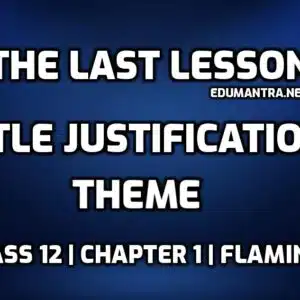
Take a closer look at “The Last Lesson,” based on the themes of loss of cultural identity. from your Class 12 English book, Flamingo. We’re going to talk about the main idea this story in a simple way, breaking it down point wise. This post is for students who want to understand the story better and for teachers who are looking for ways to make this story clearer to their students. Let’s dive into what The Last Lesson theme is-
The Last Lesson Theme in Short
The theme of the Last lesson is “the value and loss of cultural identity.”
Justification
The theme is reflected through Franz, the main character, who realizes the importance of his native language and culture only when it’s on the verge of being replaced. His emotional response to his last French lesson, amidst the backdrop of an occupying force imposing their language, underscores the deep connection between language, identity, and heritage.
Also Read:
- Hard Words : The Last Lesson
- The Last Lesson NCERT Solutions
- The Last Lesson Long Question Answer
- The Last Lesson Short Question Answer
Based on the chapter the Last lesson, we find the other themes also in this chapter:
1. Loss of cultural identity and language
2. Impact of political changes on everyday life
3. Importance of education and regret over missed opportunities
4. Sense of community and shared heritage
5. Resistance and resilience in the face of adversity
Also Read:
Following is the detail of each theme we observe in the chapter the Last lesson from the book Flamingo for Class 12-
1. Loss of cultural identity and language: This theme is clear when M. Hamel announces that it’s the last French lesson because an order from Berlin permits teaching only German in Alsace and Lorraine. This moment highlights the emotional and cultural impact of losing one’s native language, as experienced by Franz and the villagers.
2. Impact of political changes on everyday life: Big political events, like the Franco-Prussian War and Prussia taking over Alsace and Lorraine, changed how villagers lived, especially in schools. When Franz found out his lessons were ending, he finally understood how important they were. This shows that big decisions by leaders can really affect people’s personal lives.
3. Importance of education and regret over missed opportunities: Franz feels sorry for not caring about his studies before. He realizes too late that learning is very important. This story reminds us to value our education.
4. Sense of community and shared heritage: The presence of the entire village, including former students and elders, in M. Hamel’s classroom for the last French lesson symbolizes a unified community facing loss together. This collective participation demonstrates the villagers’ shared heritage and solidarity.
5. Resistance and resilience in the face of adversity: M. Hamel wrote “Vive La France!” on the board during their last class. He acted bravely, showing he wouldn’t give up his culture even when things were tough. This was his way of quietly standing up to those in control.